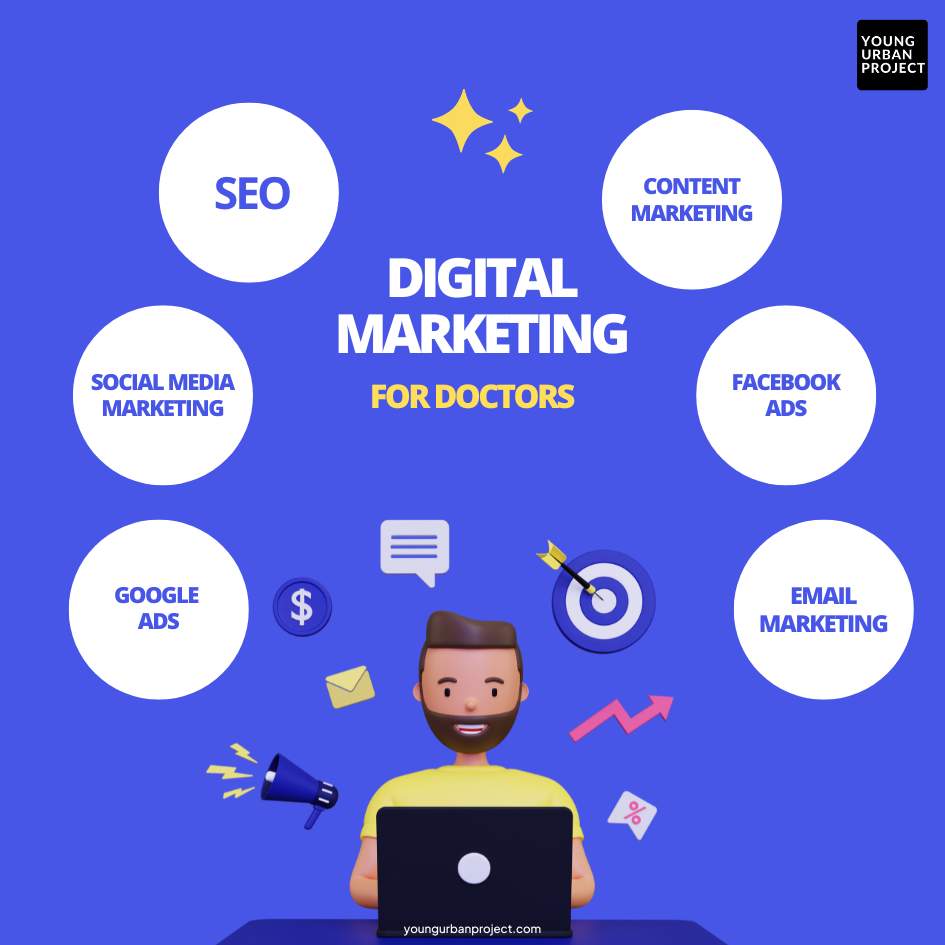The healthcare industry has undergone a significant shift in past few years. As patients increasingly turn to the internet to find healthcare providers, digital marketing has become essential for doctors. Whether you run a private practice, manage a clinic, or work in a specialized field, an effective digital marketing strategy can help you connect with potential patients, improve patient engagement, and grow your practice. In this blog, we will explore actionable tips and best practices for digital marketing for doctors, helping you build a powerful online presence.
Table of Contents
Why is Digital Marketing for Doctors Important?
Patients now rely heavily on online search engines, review sites, and social media to make decisions about healthcare providers. 94% of healthcare patients check online reviews before going to a doctor. This means that doctors who embrace digital marketing have a far better chance of reaching new patients than those who rely solely on traditional marketing methods. Digital marketing for doctors is crucial because it allows you to:
- Increase your visibility in search engine results.
- Build trust and credibility with patients through positive reviews and informative content.
- Engage with patients before and after appointments via social media and email marketing.
- Attract new patients through paid advertising and targeted campaigns.
By developing an online presence, you not only enhance your reputation but also make your practice more accessible to patients searching for your services.
Creating A Strategy: Digital Marketing for Doctors

A successful digital marketing strategy involves several elements. Here’s a step-by-step guide to building a robust digital marketing plan for doctors:
1. Optimize Your Website for Search Engines (SEO)
Your website is the cornerstone of your online presence. To ensure that patients find you when searching for doctors in their area or your medical specialty, you need to optimize your website for search engines.
- Use relevant keywords: Incorporate keywords like “primary care doctor,” “pediatrician in [location],” or “best cardiologist” in your website content. Ensure the keyword “digital marketing for doctors” appears naturally in your blog or service descriptions to target other medical professionals looking for digital solutions.
- Optimize for local search: Include your practice’s location on every page of your site. Use tools like Google My Business to ensure your practice appears in local search results.
- Mobile optimization: As of August 2024, mobile devices now drive 61.95% of all website traffic. Make sure your site is mobile-friendly to cater to patients searching on their smartphones.
- Add a blog: Blogging is a great way to educate patients and boost your SEO. Write about topics relevant to your practice, such as common medical conditions, treatment options, or healthy lifestyle tips.
2. Leverage Social Media for Patient Engagement
Social media is an effective way to build relationships with your patients and establish trust. Platforms like Facebook, Instagram, and LinkedIn allow you to engage with your audience in a meaningful way.
- Create valuable content: Share tips, news, or updates related to healthcare. Patients appreciate valuable, informative content that answers their questions or helps them stay healthy.
- Engage with patients: Respond to comments and messages in a timely and professional manner. Social media allows for more personal interactions, which can build patient loyalty.
- Run social media ads: Platforms like Facebook and Instagram allow you to run highly targeted ads. You can target potential patients by age, location, interests, or even health conditions.
3. Build a Strong Online Reputation with Reviews
Online reviews play a major role in how patients choose doctors. Potential patients often look at platforms like Google Reviews, Practo, or RateMDs to find the best-rated doctors in their area.
- Encourage reviews: Ask satisfied patients to leave a review after their appointment. Provide them with clear instructions or a direct link to your review page.
- Respond to reviews: Whether positive or negative, responding to reviews shows that you care about patient feedback. This builds trust and credibility with future patients.
- Manage negative reviews: If you receive a negative review, respond professionally and offer to resolve the issue offline. This demonstrates that you’re dedicated to providing excellent patient care.
4. Email Marketing for Patient Retention
Email marketing remains one of the most effective ways to keep in touch with existing patients and nurture relationships over time.
- Send appointment reminders: Regular appointment reminder emails can reduce no-shows and keep your schedule full.
- Share health tips and newsletters: Provide valuable content to your patients through email, such as seasonal health tips, updates on new treatments, or clinic news.
- Promote services or events: If you offer new services, host events, or participate in community health fairs, email is an effective way to notify your patients.
Paid Advertising: A Boost for Your Practice
While organic search engine optimization and social media engagement can bring steady traffic, paid advertising can give your digital marketing a quick boost. Paid advertising options include:
1. Google Ads

Google Ads allows you to target patients based on specific keywords they search for, such as “pediatrician near me” or “dermatologist in [city].” You only pay when someone clicks on your ad, making it a cost-effective option. Google Ads is particularly useful for doctors in competitive markets where ranking organically is challenging.
2. Meta Ads

Meta Ads offer highly targeted advertising, allowing you to reach potential patients by demographics such as age, location, and interests. You can promote your services, share patient testimonials, or announce special events. A well-executed Facebook Ads campaign can significantly increase your patient base.

Content Marketing for Doctors: Building Trust Through Education
Content marketing is all about creating and distributing valuable information that addresses the needs of your target audience. This can include blog posts, videos, infographics, and more.
1. Create Informative Blog Posts
Blogging is a powerful tool for educating your patients while boosting your website’s SEO. Write blog posts that address common health concerns, explain medical procedures, or offer preventive care tips. For instance, if you’re a dermatologist, you might write posts on skincare routines, sun protection, or treatments for acne.
2. Use Video Marketing
Video content is growing rapidly in popularity, and doctors can take advantage of this trend to build trust with potential patients. Create educational videos about common health issues, showcase your practice, or introduce your team. Patients appreciate seeing a friendly, knowledgeable face before their appointment.
3. Patient Testimonials and Case Studies
Sharing patient testimonials or case studies on your website and social media can have a huge impact. These stories build trust by demonstrating your success and expertise. Always obtain permission from your patients before sharing their stories.
Tracking the Success of Your Digital Marketing Efforts
To ensure that your digital marketing strategy is effective, you need to track key metrics and adjust your tactics accordingly. Some important metrics to monitor include:
- Website traffic: Use tools like Google Analytics to monitor how many people visit your site, how they find you, and which pages they spend the most time on.
- Conversion rates: Track how many website visitors book an appointment or call your practice. This will give you insight into the effectiveness of your website and advertising campaigns.
- Social media engagement: Measure the number of likes, shares, comments, and clicks on your social media posts to determine which types of content resonate with your audience.
- Email open and click-through rates: Monitor how many patients are opening your emails and clicking on the links inside. If your rates are low, consider adjusting your subject lines or content.
Conclusion
Digital marketing for doctors is not just a trend but a necessity in today’s healthcare landscape. By optimizing your website, engaging patients on social media, maintaining a strong online reputation, and leveraging email marketing, you can significantly improve your practice’s visibility and patient relationships. Paid advertising and content marketing further enhance your digital presence, allowing you to attract new patients and build lasting connections. As healthcare continues to evolve, embracing digital marketing will ensure that your practice thrives for years to come.
FAQs: Digital Marketing for Doctors
Why is digital marketing important for doctors?
Digital marketing is essential for doctors because it helps increase visibility, attract new patients, build trust, and improve patient engagement. As more patients turn to the internet to find healthcare providers, having a strong online presence ensures your practice remains competitive and accessible.
What are the key strategies in digital marketing for doctors?
Some key digital marketing strategies include:
-Search engine optimization (SEO) for your website.
-Social media marketing to engage with patients.
-Online reputation management through reviews.
-Email marketing for patient retention and communication.
-Paid advertising like Google Ads and Facebook Ads.
How can doctors use SEO to attract more patients?
SEO (Search Engine Optimization) involves optimizing your website to rank higher on search engines like Google. This includes using relevant medical keywords, optimizing for local search, improving website speed, and creating high-quality content like blogs. Higher rankings lead to more visibility, which translates into more patient inquiries.
How can social media benefit my medical practice?
Social media platforms like Facebook, Instagram, and LinkedIn allow doctors to engage with current and prospective patients. You can share educational content, post updates, answer questions, and run targeted ads to attract specific patient demographics. It helps build trust and a sense of community around your practice.
How do I encourage my patients to leave online reviews?
Encourage patients to leave reviews by asking them politely after their visit, either in person or via email follow-ups. Make it easy for them by providing direct links to review platforms like Google Reviews. Positive reviews help build your online reputation and attract new patients.
What is the best platform for doctors to advertise online?
Google Ads and Facebook Ads are two of the most effective platforms for doctors. Google Ads allows you to target patients searching for specific medical services, while Facebook Ads enable you to run highly targeted campaigns based on demographics like age, location, and health interests.
How can email marketing help doctors grow their practice?
Email marketing allows doctors to stay in touch with patients, send appointment reminders, share health tips, and promote new services. It’s an effective way to keep patients engaged, reduce appointment no-shows, and build long-term relationships.
How can content marketing help build trust with patients?
Content marketing, such as writing blog posts, creating videos, or sharing patient testimonials, helps educate patients and build trust. By offering valuable information on medical topics, you establish yourself as a knowledgeable and reliable healthcare provider, which increases patient confidence.
How do I track the success of my digital marketing efforts?
You can track success by monitoring key metrics like website traffic, conversion rates (how many visitors book appointments), social media engagement (likes, comments, shares), and email open/click-through rates. Tools like Google Analytics and social media insights can provide valuable data to measure the effectiveness of your digital marketing campaigns.
What is local SEO, and why is it important for doctors?
Local SEO focuses on optimizing your online presence to attract patients from your geographic area. For doctors, this is critical because most patients search for healthcare providers nearby. Claiming your Google My Business listing, using location-specific keywords, and ensuring accurate NAP (name, address, phone number) information are essential for local SEO success.

